- europages
- >
- COMPANIES - SUPPLIERS - SERVICE PROVIDERS
- >
- crushed stone
Results for
Crushed stone - Import export
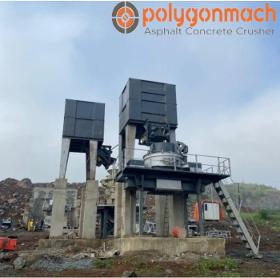
POLYGONMACH MAKINE SANAYI VE TICARET LTD STI
Turkey
Dolomyte, also called dolostone, is a sedimentary rock that contains large quantities of crushed Dolomyte mixed with small amounts of calcite and aragonite. It is thus typically formed in marine environments in which the presence of limestone has been chemically altered by magnesium-rich waters over geological time scales. As magnesium in the water reacts with calcium carbonate in the limestone some of the calcium in the limestone is replaced by magnesium. Rock formed in this manner is Dolomyte. Dolomyte rocks typically manifest in different colors, including white, grey, pink, or green, depending on the presence of impurities in the rock. Its compositions endows it with some unique properties, and for these reasons, it gets widely applied in multiple industries.
Request for a quote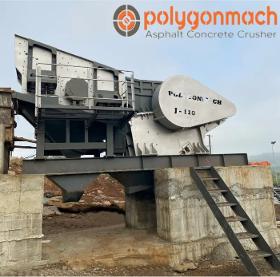
POLYGONMACH MAKINE SANAYI VE TICARET LTD STI
Turkey
It is a 250-350 TPH capacity Gabbro Crushing Screening Plant engineered to perform important functions in the natural production of large volume gabbro stone material effectively. It, in most instances, carries the processing of 250-350 tons in an hour. The plant incorporates the most advanced crushing and screening technology to produce good-quality output. Normally, it all starts with the primary crushers, normally jaw crushers that crush big gabbro rocks into smaller pieces. Basically, the primary size reduction serves to kind of condition the material to a state where further processing can be achievable. Tertiary and secondary crushers secure the appropriate sizing of the material after a primary crusher. The crushed gabbro later on is classified by the vibrating screens into different sizes in order to assure reliability in the final aggregates that conform to the needs, requirements, and specifications of constructions.
Request for a quote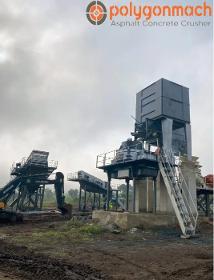
POLYGONMACH MAKINE SANAYI VE TICARET LTD STI
Turkey
A 100-150 TPH Gabbro Crushing Screening Plant is a high-class engineering facility designed to convert gabbro rock to high-quality aggregates at a production rate that ranges from 100 to 150 tons per hour. The type of this plant has been designed specially to optimize crushing and screening operations that make huge blocks of gabbro into crushed aggregates with strict dimensional tolerance and used for other construction purposes. It generally begins with primary crushing, where jaw crushers break raw gabbro into pieces of more manageable sizes. This is followed by secondary and then tertiary crushing stages, in which other crushers incrementally break down the material into predefined aggregate sizes. The last process is screening, in which vibrating screens separate the crushed material into size fractions, thus ensuring uniformity and consistency in the final product.
Request for a quote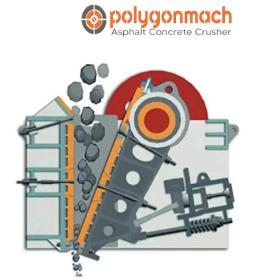
POLYGONMACH MAKINE SANAYI VE TICARET LTD STI
Turkey
In order to reduce size sort and separate different kinds of materials including stones ores and minerals crushing and screening plants also called crushing and screening systems are facilities used for this purpose. Screens are used to sort or separate the crushed material according to size shape or other properties. These plants normally consist of crushers for breaking large materials into smaller pieces. Plants for crushing and screening primarily serve to change raw materials into the precise sizes or forms needed for additional processing or use in a variety of industries including mining construction and recycling. While the screening equipment divides the crushed material into various fractions according to predetermined criteria the crushing equipment aids in the breakdown of large materials into manageable sizes.
Request for a quote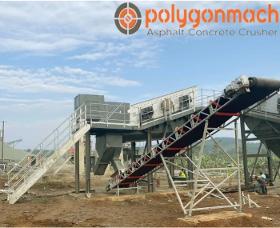
POLYGONMACH MAKINE SANAYI VE TICARET LTD STI
Turkey
The 150-250 TPH Dolomite Crushing Screening Plant is an installation designed to treat specially dolomite-bearing ore. After processing through crushing and screening, dolomite is produced in different aggregate sizes that find target applications. The abbreviation "TPH" expands into "tonnes per hour," asserting this plant's capacity to treat 150-250 tonnes of dolomite ores on an hourly basis. Dolomite is a type of double-carbonate mineral. Such a composition of calcium magnesium carbonate has immense use, mostly in the construction industry, both of concrete aggregates and in the manufacture of road-based materials. Such plants are involved in the effective crushing and screening of dolomite ore for the production of quality aggregates, which form the fundamental ingredients for infrastructure construction works where supply has to be ensured.
Request for a quote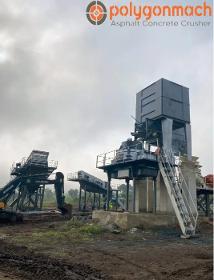
POLYGONMACH MAKINE SANAYI VE TICARET LTD STI
Turkey
Mobile crushing and screening plants 250-350 tph RS represent a highly technological, skilfully designed material processing equipment aimed at producing high-quality end-aggregates for different levels of Riverstone crushing. These plants integrate special primary crushing equipment, screening machinery, and conveyors for the proper processing of Riverstones into aggregates of different sizes, used in a variety of construction, landscaping, and industrial applications. On the first stage of processing, primary crushers—jaw crushers or impact crushers—are used; at the start of the processing cycle, raw Riverstones get broken down into small shreds. This primary crushing stage is designed to be necessary for the reduction of the size of Riverstones raw material, preparatively for further processing stages. After primary crushing, it is fed into screening equipment—generally, vibrating screens—which sorts the aggregate into various fractions classified based on their sizes.
Request for a quote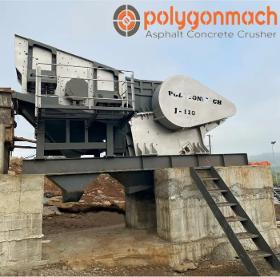
POLYGONMACH MAKINE SANAYI VE TICARET LTD STI
Turkey
100-150 tph Riverstone Crushing and Screening plants are advanced facilities designed to process Riverstones into high-quality aggregates efficiently at an output range between 100 and 150 tons per hour. Such plants comprise basic crushers, screening machines, and conveyors designed to make sure that Riverstones are broken to the required particle size of aggregates required in many building, landscaping, and industrial applications. Apart from such plants, the basic crushers include primary crushers, for example, jaw or impact crushers, which are important in the initial breaking of raw materials into smaller fragments at the start of the operation cycle. Following the process of primary crushing, the product is fed into screening equipment, usually vibrating screens, classifying the aggregates into several fractions based on size. This careful screening of aggregates ensures all final products meet the specifications and standards expected for various construction projects, landscape
Request for a quote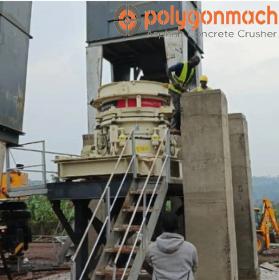
POLYGONMACH MAKINE SANAYI VE TICARET LTD STI
Turkey
The 500-750 tph Gabbro Crushing Screening Plant is an industrial setup primarily designed for taking in gabbro rock, a rough, coarse-grained igneous rock, and crushing it into various sizes of aggregate material. This plant is eminently suitable for large mining and quarrying operations where there is a need for high-quality aggregate in substantial quantities. It can process 500 to 750 tons per hour, thus forming the central part of intensive and large-scale operations. Crushing and screening equipment is designed to manage the hard and brittle nature of gabbro by breaking it down into small pieces. This screened material is then sorted into a number of fractions. All these fractions should be such that they meet the ultimate needs of construction and industrial projects. Gabbro is one kind of rock considered to be very close to many igneous stones, for instance, granite and basalt. It is in much demand in the construction industry because it is hard and strong; thus,
Request for a quote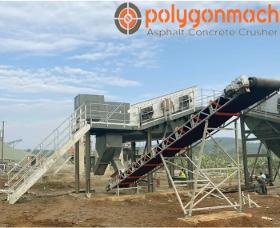
POLYGONMACH MAKINE SANAYI VE TICARET LTD STI
Turkey
The 150-250 TPH Gabbro Crushing Screening Plant is designed to process the gabbro stone material efficiently at an average capacity of 150-250 tons per hour. The plants are equipped with advanced crushing and screening technology, ensuring an effective volume of Gabbro rocks and producing high-quality aggregates to address construction needs. The process begins with primary crushers, such as jaw crushers, which break the big gabbro rocks into small lumps. These primary lumps are further broken into desired aggregate sizes by secondary and tertiary crushers. The vibrating screens sort aggregate material produced from the various stages of crushers into several fractions in regard to size from the crushed gabbro. This ensures that the final product is homogenous and falls within the specifications required in various construction applications.
Request for a quote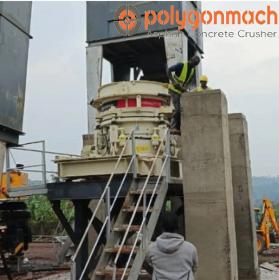
POLYGONMACH MAKINE SANAYI VE TICARET LTD STI
Turkey
A (VSI) Vertical Shaft Impact Crusher, commonly known as VSI crusher, is a type of crushing machine that utilizes a high-speed rotor with wear-resistant tips or anvils to crush materials into fine particles. Unlike conventional crushers that use compression or impact forces to break down materials, VSI crushers operate by throwing the material against stationary anvils, shaping the material into desired sizes. This process occurs as the rotor spins at high speeds, centrifugal forces propel the material outward, and the impact between the material and the anvils crushes the material into smaller particles. (VSI) Vertical Shaft Impact Crusher are renowned for their ability to produce well-shaped cubical end products and are commonly used in the production of high-quality aggregates, sand, and other construction materials. (VSI) Vertical Shaft Impact Crusher are versatile machines that find widespread applications in various industries, including mining, quarrying, and construction.
Request for a quote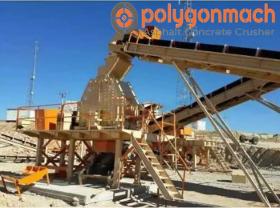
POLYGONMACH MAKINE SANAYI VE TICARET LTD STI
Turkey
A Tertiary Impact Crusher can be understood as a kind of crushing machine to carry out further reduction of material past primary and secondary crushers. The Tertiary Impact Crusher works as an HSI. The stocky rotor customer-engineered by General Kinematics to have impact tools blowing bars or hammers turning at higher speeds smashes the material. These impact tools work extremely fast to achieve impacts that will break down the material into small, homogenized, and delicate particles. Our Tertiary Impact Crushers are designed for making optimal shaped aggregates and crushed materials with high fineness, for maximum control over particle size and shape and contributing to the achievement of product requirements in various industries and applications. Tertiary Impact Crushers are important in the final stage of crushing. This has been declared to be the final shattering that the materials undergo, which puts them to the characteristics needed in the end product.
Request for a quote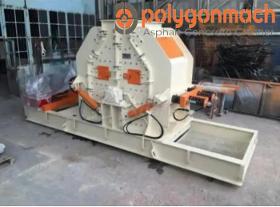
POLYGONMACH MAKINE SANAYI VE TICARET LTD STI
Turkey
The Horizontal Shaft Impactor (HSI) commonly referred to as a Tertiary Impact Crusher is a type of crushing equipment used to further reduce materials that have been processed through primary and secondary crushers into even finer particles. The last stage of crushed materials with exact particle sizes and shapes are usually produced by tertiary impact crushers. They work by applying high-speed impacts to break down the material using a horizontal shaft fitted with hammers or blow bars. A tertiary impact crushers main purpose is to refine the product to the appropriate size and shape in order to meet particular needs in a variety of applications including mining recycling and aggregate production. By producing finely crushed products appropriate for end-use applications tertiary impact crushers play a critical role in the last stage of material processing.
Request for a quote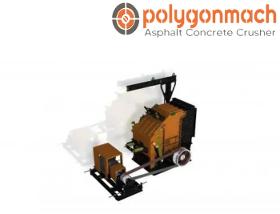
POLYGONMACH MAKINE SANAYI VE TICARET LTD STI
Turkey
A Secondary Impact Crusher is a type of crushing machine that typically comes in the form of a Horizontal Shaft Impactor (HSI). This crusher is designed to provide secondary or tertiary crushing capabilities by generating high-speed impact forces to further reduce the size of the material processed. In comparison to a Primary Impact Crusher, a Secondary Impact Crusher is usually aimed at producing smaller, finer particles and more refined end products. It operates by utilizing a rotating rotor equipped with impact tools such as hammers or blow bars that strike the incoming material, causing it to break apart through impact forces. Secondary Impact Crushers are commonly used after primary crushers in various industries such as mining, quarrying, and recycling to achieve a more refined product size or shape. These crushers excel at producing well-shape aggregates, finely crushed materials, and secondary applications requiring fine particle sizes.
Request for a quote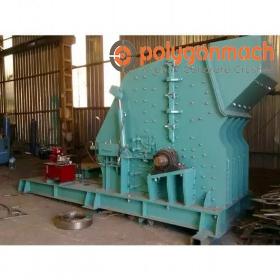
POLYGONMACH MAKINE SANAYI VE TICARET LTD STI
Turkey
Similar to a primary impact crusher a secondary impact crusher (HSI) is a kind of crushing equipment that produces products with a finer more uniform size. Secondary impact crushers are frequently used following the primary crushing stage because they can handle smaller feed sizes than primary crushers. The material enters the crusher and is struck by hammers or blow bars attached to a rotor which breaks the material apart and reduces its size even more. The capacity of secondary impact crushers to produce high-speed impacts that pulverize material into a finer product appropriate for secondary crushing or final applications in a variety of industries is well known. The capacity of Secondary Impact Crushers to generate a variety of products such as fine aggregates sand and finely crushed materials accounts for their adaptability. In industries like mining and recycling or in the manufacturing of asphalt and concrete aggregates where a higher level of product refinement is necessary
Request for a quote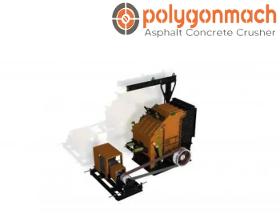
POLYGONMACH MAKINE SANAYI VE TICARET LTD STI
Turkey
One kind of heavy-duty crushing machinery that uses impact force to reduce material size is the Horizontal Shaft Impactor (HSI) Primary Impact Crusher. The material is shattered by the impact force and the high-speed collisions against the plates or other particles in an HSI crusher which uses a rotating horizontal shaft to propel material towards fixed breaker plates as opposed to jaw crushers which compress the material between two plates. For many aggregate applications a high-quality cubical-shaped product is what this crushing method excels at producing. The HSI crusher is a great option for primary crushing operations where large materials need to be broken down efficiently because of its design which enables it to handle larger feed sizes. Because of its adaptability and capacity to produce a variety of particle sizes with good shape the HSI Primary Impact Crusher finds extensive application in the recycling and construction sectors as well as in mineral processing operations.
Request for a quote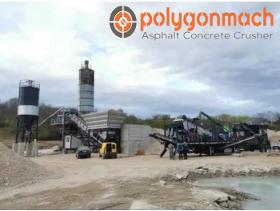
POLYGONMACH MAKINE SANAYI VE TICARET LTD STI
Turkey
The PMCC2 is a mobile jaw and cone crusher - 1 for the secondary and tertiary grades of crushing and screening. It includes a primary Jaw Crusher and a secondary or tertiary Cone Crusher. This system allows for the effective processing of literally any material, from hard stone to soft minerals, which gives great flexibility and versatility in the operation of material crushing. The PMCC2 model features high performance, mobility, and adaptability, thus making it ideal for mining, construction, and quarrying applications for the production of different grades of aggregates. This unit comes typically equipped with advanced technologies for best efficiency and quality of output, thereby leading to successful material processing operations. Introducing the game-changing PMCC-2 from Polygonmach—a crushing and screening plant on wheels that comes with the jaw-jaw configuration, hosting 120-150 TPH robust capacity, depending upon the gradians of material hardness.
Request for a quote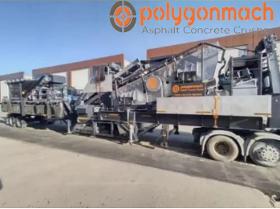
POLYGONMACH MAKINE SANAYI VE TICARET LTD STI
Turkey
Mobile Jaw and Cone Crusher 1-PMCC1 can be classified into the category of mobile crushing and screen equipment. It has the potential to process an extensive variety of materials by combining jaw and cone crushing. This unit usually is equipped with a jaw crusher acting as primary crusher equipment, which can break stones or minerals to small pieces, making them easy to handle. The cone crusher allows for secondary or tertiary crushing, creating high and homogeneous final output, which are further processed or used as end products. Typically, most PMCC1 models are fitted with such advanced features, giving them adjustable settings to control the size of the output material to be produced, hence flexibility in meeting all other project requirements. PMCC1 will be provided with a combination of both jaw and cone crushers that will offer an integrative solution for mining, construction, quarrying, and other industries of a like nature in processing different materials.
Request for a quoteDo you sell or make similar products?
Sign up to europages and have your products listed
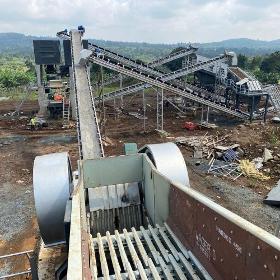
POLYGONMACH MAKINE SANAYI VE TICARET LTD STI
Turkey
700-1000 TPH Basalt Crushing and Screening Plant is made for basalt aggregate producing at high production through output. Basalt Crushing and Screening Plants can be used for many different purposes in a wide range of sizes, according to the third stage of the modern performance-made machine and machinery. These plants have a reinforcement of strong basalts that are characteristic of very great volcanic stones of high durability. These plants basically break large boulders of basalt rocks into smaller chips and thereafter screen them to generate high-quality aggregate, suitable for a large variety of applications in construction, infrastructure development, and industrial projects. These plants, by processing basalt rocks, play an important role in delivering strong materials needed for construction projects where durable and reliable aggregates are required to support heavy loads and environmental conditions.
Request for a quote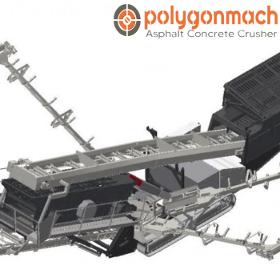
POLYGONMACH MAKINE SANAYI VE TICARET LTD STI
Turkey
Our track-mounted impact crusher is a powerhouse, uniquely designed to deliver exceptional crushing performance and boast a high capacity of 200 - 350 t/h. This strong machine has an impressive opening size of 1,200 x 900 mm that enables it to carry out effective processing of big-sized materials. The rotor size is 1100 x 1300 mm. Due to intensive crushing along the whole length of the crusher, an optimal treatment result is achieved. Impressive in weight-54,000 kg-our crusher was meant for harsh conditions to give you years of dependable service on your most demanding projects.
Request for a quote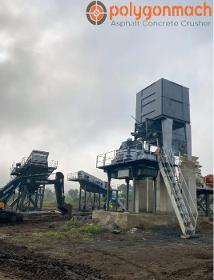
POLYGONMACH MAKINE SANAYI VE TICARET LTD STI
Turkey
150-250 tph Riverstone Crushing and Screening Plants are specialized facilities designed to process Riverstones into high-quality stone aggregates within a throughput capacity range of 150 to 250 tons per hour. These plants consist of essential components such as primary crushing equipment, screening machinery, and conveyors tailored to handle Riverstone materials efficiently. The primary crushing stage involves crushers like jaw crushers, cone crushers, or impact crushers that break down large Riverstones into smaller fragments, preparing them for subsequent processing within the specified throughput capacity. Following primary crushing, the material is directed to screening equipment, such as vibrating screens, which classify the Riverstone aggregates into different fractions based on size requirements. This meticulous screening process ensures that the final aggregates meet stringent quality standards necessary for various construction, landscaping, and industrial applications.
Request for a quote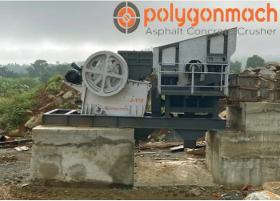
POLYGONMACH MAKINE SANAYI VE TICARET LTD STI
Turkey
350-500350-500 tph Dolomite Crushing Screening Plants are modern industrial plants designed to process dolomite ore in order to produce a great variety of dolomite aggregates that are demanded by different construction projects. The abbreviation "tph" itself means the capacity of the plant dealing with the amount of material per hour; therefore, this plant processes 350 to 500 tons of dolomite ore in an hour. Dolomite, the calcium magnesium carbonate mineral, is very essential in the construction industry in making concrete aggregates and road base materials, among other important construction materials. These high-capacity plants play an important role in the crushing and screening of dolomite ore efficiently into specified requirements for construction projects, thereby ensuring a constant supply of superior quality dolomite aggregates for construction applications.
Request for a quote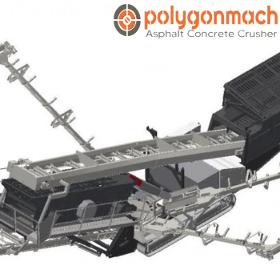
POLYGONMACH MAKINE SANAYI VE TICARET LTD STI
Turkey
Our track VSI crusher is designed with meticulous care to meet modern crushing applications, especially for the production of sand up to the most important tertiary or quaternary crushing stage. Designed with the vision for versatility and efficiency, this crusher has been placed in the priority list for working with urban projects due to its compact build and performance. The advanced Rockshell 3/5 Port Rotor and Anvil Ring Open Shoe Table are such features that enable this track VSI crusher to deliver better outputs all the time. This makes it the most ideal choice for producing high-quality aggregate to meet the standards required by the current construction industry. Available in three versatile models, namely PTV700, PTV800, and PTV900, this crusher is able to offer solutions to achieve optimal performances at different scales of operations.
Request for a quote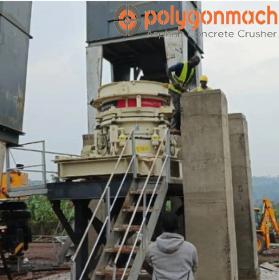
POLYGONMACH MAKINE SANAYI VE TICARET LTD STI
Turkey
A 40-60 TPH dolomite ore crushing and screening plant is a dolomite processing plant, which processes dolomite ore into the required sizes of any kind of aggregate that is used in construction. A TPH is a unit representing tonnes per hour. In this description, the plant has an input capacity to accommodate and treat between 40 and 60 tons of dolomite ore per hour. Dolomite is an important mineral rock that is high in calcium magnesium carbonate and finds much application in the construction industry, particularly in the manufacture of concrete aggregates and road base materials, among other construction-based products.
Request for a quote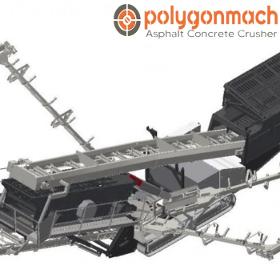
POLYGONMACH MAKINE SANAYI VE TICARET LTD STI
Turkey
Our track cone crusher PTK156 is designed to deliver ultimate efficiency and performance in a large number of crushing applications. The hybrid drive system of the crusher integrates the reliability of Volvo, Cummins, and Perkins Tier 3-4 engines. This advanced hybrid technology further ensures lower fuel consumption and reduced emission, therefore an eco-friendly cost-effective solution. The crusher provides really ample screening area for materials to be processed, with a top deck measurement of 5,000 x 1,500 mm and a bottom deck of 5,000 x 1,400 mm. Coming with a weight of 34,500 kg, it is truly robust and durable to meet the harshest situations.The hybrid drive system of the PTK 156 track cone crusher is a powerful combination of forces by Volvo, Cummins, and Perkins Tier 3-4 engines. It perfectly balances diesel and electrical power with great high performance while keeping fuel consumption and emissions at a minimum. The hybrid drive works regularly and reliably
Request for a quote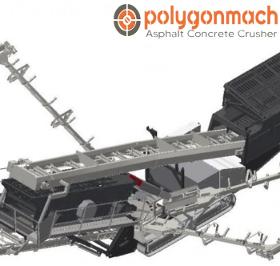
POLYGONMACH MAKINE SANAYI VE TICARET LTD STI
Turkey
Our Track Cone Crusher PTC 200 is intelligently engineered in view to provide the best performance and efficiency in various kinds of crushing applications. It is fitted with the Metso HP200 cone type, with the head diameter of 940 mm and is driven by a 132 kW motor. The overall weight of the crusher is 12,160 kg for adding durability and stability to the operation. The feed opening is 185 mm, while the maximum capacity goes up to 250 Mtph. The PTC 200 is ideal for high-demand crushing, with a track-mounted cone crusher capacity of 250 Mtph (275 Stph). The feed opening is 185 mm or 7 inches, meaning that the feeding dimensions are quite big to keep the flow constant. High capacity ensures meeting project deadlines with much operational efficiency. Strong motor with robust design for continuous performance: you can process big volumes fast and efficiently. The track cone crusher PTC 200 is designed with the Metso HP200 cone model, exclusive in its performance.
Request for a quote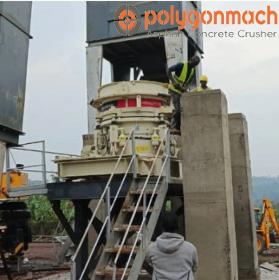
POLYGONMACH MAKINE SANAYI VE TICARET LTD STI
Turkey
The 40-60 TPH Riverstone crushing and screening plants are made for the production of top-quality aggregates from Riverstones effectively at a capacity of 40-60 short tons per hour. The pre-primary crushing machinery, screening equipment, and conveying systems of this plant are specially designed for the processing of Riverstones. These plants break the raw Riverstones into smaller pieces with the help of primary crushers such as jaw crushers or impact crushers. This starts the initial process. The product from primary crushing is later passed through vibrating screens for the purpose of classifying the aggregates into various fractions according to size. This screening procedure is very vital to ensure that the final aggregates produced meet the quality standards for use in various construction, landscaping, and industrial applications. By processing Riverstones systematically, the 40-60 tph Riverstone Crushing and Screening Plants turn them into a better aggregate that will
Request for a quote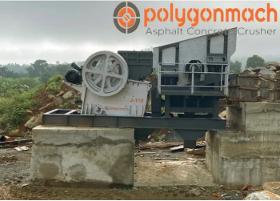
POLYGONMACH MAKINE SANAYI VE TICARET LTD STI
Turkey
700-1000 tph Granite Crushing and Screening Plants are the latest facilities. The plants aim, particularly, in the processing of stone granites to high-quality aggregates with a variable capacity of 700 to 1000 tons per hour. These advanced plants have been engineered with primary crushers, secondary crushers, vibratory screening plants, conveyors, and feeders facilitating efficient crushing and screening. Where primary crushers in the plant reduce oversized granite rocks to smaller fragments, secondary crushers continue to refine the material one step further to the target sizes for aggregates. Thoroughly screened using vibrating screens, the aggregate fractions are then sized and classified according to sizes into the final product to a very high standard to every highly diversified usage in construction, infrastructure, and industry. Through processing granite stones in a systematic manner, such plants give high-quality aggregates that are used in different construction projects to
Request for a quote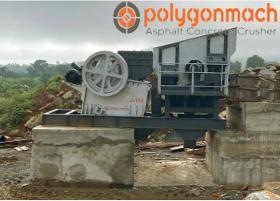
POLYGONMACH MAKINE SANAYI VE TICARET LTD STI
Turkey
The 250-350 tph Granite Crushing and Screening Plant is technically a very advanced construction that is meant to produce granite stones with different aggregates of 0-5, 5-10, 10-15, and 15-20 mm. These plants consist of primary crushers, secondary crushers, vibrating screens, conveyors, and feeders that have been designed to optimize the crushing and screening process fully. The primary crushers of these plants perform a highly important function in the process of fragmentation of large stones of granite and their crushing into small pieces, which will later be reduced by the secondary crushers to the desired size of aggregates. After that, the fractioned material goes through the vibrating screens for a strict screening and separation into fractions according to size, thus providing that the final aggregates will be in strict compliance with high-quality specifications for use in construction works and other industrial applications.
Request for a quote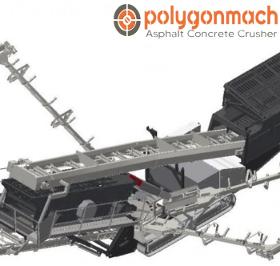
POLYGONMACH MAKINE SANAYI VE TICARET LTD STI
Turkey
Our track-mounted impact crusher has been designed to offer superior performance and applicability. The rugged capacity of our machine ranges from 120 to 250 t/h, making it versatile for various applications in the industry. The rotor size stands at 1,050 x 820 mm, giving fair crushing results that will provide good-quality aggregates. This weight of the crusher at 41,800 kg reflects solidity in construction, resilient to bear some of the harshest conditions. These technical specifications speak to our commitment to high-performance equipment that addresses our customer's needs. High Capacity Crushing Optimised The track-mounted impact crusher has a high throughput and is fitted with a capacity ranging from 120 to 250 t/h, thus being perfectly suitable for large-scale projects. This assured high capacity will ensure that you process substantial volumes of material efficiently and hence minimize the hour consumption of operations, raising your productivity.
Request for a quoteResults for
Crushed stone - Import exportNumber of results
70 ProductsCountries
Company type